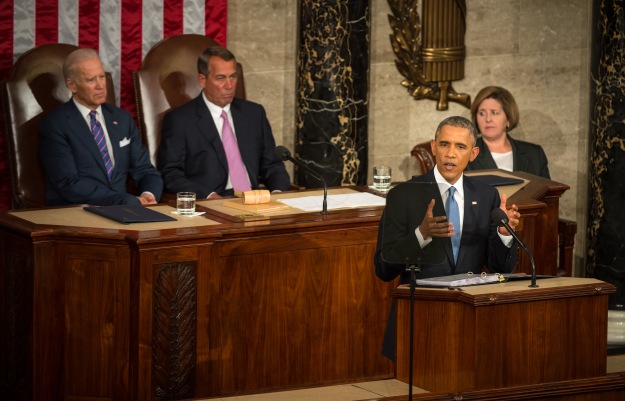
White House photo
Previously published at GBH News.
The dichotomy at the heart of any State of the Union address was on full display Tuesday night. The president’s annual message to Congress is a major news event. Yet it is fundamentally a political exercise.
So when serious news from the outside world intrudes, cognitive dissonance ensues. That was surely the case during President Joe Biden’s first State of the Union as well as in the subsequent coverage.
How did the pundits handle it? For the most part, they treated it as two speeches — a sober, even stirring call to support the Ukrainian people as they fight desperately to hold off an unprovoked invasion by Russian forces, and a domestic-policy address aimed at shoring up Biden’s miserable poll numbers.
“It was as inspiring as any section of a State of the Union, in large part because it was about something bigger and more compelling than politics as usual,” wrote Washington post columnist Jennifer Rubin of Biden’s opening, which focused on Ukraine. “Moreover, it was a rare display of bipartisanship, and a reminder that in facing external threats we can rise to the occasion…. From there on out, bipartisanship receded.”
The real-news-versus-politics divide was particularly acute in the way the war in Ukraine and the State of the Union address were played on the front pages of our three leading newspapers. The New York Times, The Washington Post and The Wall Street Journal all led with Ukraine. The Journal didn’t even place Biden’s address above the fold.
Originality was hard to find in my post-speech scan of the coverage. One exception was Ezra Klein of the Times, who noted that Biden did little — nothing, really — to prepare Americans for the economic effects of the tough sanctions that he and other Western leaders have imposed on the Putin regime.
“For all Biden’s resolve on Tuesday night, he did not try to prepare Americans to sacrifice on behalf of Ukrainians in the coming months, if only by paying higher prices at the pump,” Klein wrote. “Instead, he said, ‘my top priority is getting prices under control.’ That’s the tension Putin is exploiting.”
Divisions on the right were apparent in both the House chamber and in the subsequent commentary. During Biden’s speech, far-right Reps. Lauren Boebert and Marjorie Taylor Greene disgraced themselves by interrupting the president just as he was about to invoke the memory of his late son, Beau Biden, whose death from brain cancer may have been related to his exposure to toxic fumes while he was serving in the military.
Writing for the ultraconservative PJ Media site, Matt Margolis made the same point somewhat more artfully, criticizing Biden for talking about his dead son rather than the 13 American soldiers who were killed by terrorists during last summer’s chaotic withdrawal from Afghanistan. There was, Margolis said, “not a single word about the withdrawal” in Biden’s speech. “Not a single word to honor those who died because of his incompetence.”
At National Review, a more mainstream conservative publication, Dan McLaughlin praised Biden on Ukraine but dismissed the rest of his address, writing, “You could tell the pandemic is really and truly over when we saw a return to Democrats demonizing the pharma companies that gave us life-saving vaccines.”
McLaughlin also attempted to turn the Big Lie on its head, taking Biden to task for speaking out against voter-suppression efforts fueled by pro-Trump Republicans who dare not question the former president’s false assertions that he actually won the 2020 election. “This is hardly the first time Biden has cast doubt on the legitimacy of our elections,” McLaughlin wrote in a truly mind-bending line.
Meanwhile, Jonathan V. Last, writing for The Bulwark, a Never Trump conservative site, summarized the moment in a pre-speech assessment beneath a headline that read “The West Is Winning, Russia Is Losing, and Biden Is Doing a Good Job.”
Although Biden noticeably did not move to the center, doubling down on popular but stalled-out ideas such as a $15 minimum wage, child-care assistance and controls on drug prices, he nevertheless invoked the moderate, unifying appeal that carried him to victory over Trump.
David A. Graham of The Atlantic wrote that “rather than try to convince Americans not to believe what they’re feeling, or claim credit for things they don’t see, Biden offered them a promise that things are about to get better. To make the case, he tacked toward the middle — with a few pointed detours — delivering a speech that hews closer to the ‘popularist’ movement in the Democratic Party than to its more progressive contingent.”
“Popularism,” in case you’re unfamiliar with the term, is the idea that the Democrats should de-emphasize the more divisive aspects of their agenda in favor of those with broad support. Examples offered by Graham were Biden’s calls for more police funding and keeping kids in school during COVID-19 surges.
According to a snap poll conducted by CBS News, the speech was popular with those who were watching, with 78% saying they approved of his speech and just 22% disapproving. But, CBS cautioned, “As we’ve seen with previous presidents’ State of the Union speeches, those who watched tonight are more likely to be from the president’s own political party, boosting approval of the speech.”
In other words, whatever political benefit Biden receives from his address is likely to be short-lived. His popularity — and, thus, the Democratic Party’s prospects in the upcoming midterm elections — are likely to be grounded in matters that are largely beyond his control, such as the outcome of the war in Ukraine, the ongoing battle against COVID and the persistence of inflation in an otherwise strong economy.
For one night, though, the stage was his. It’s fair to say that he made the most of it.






